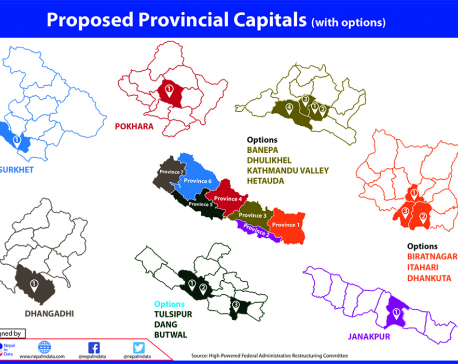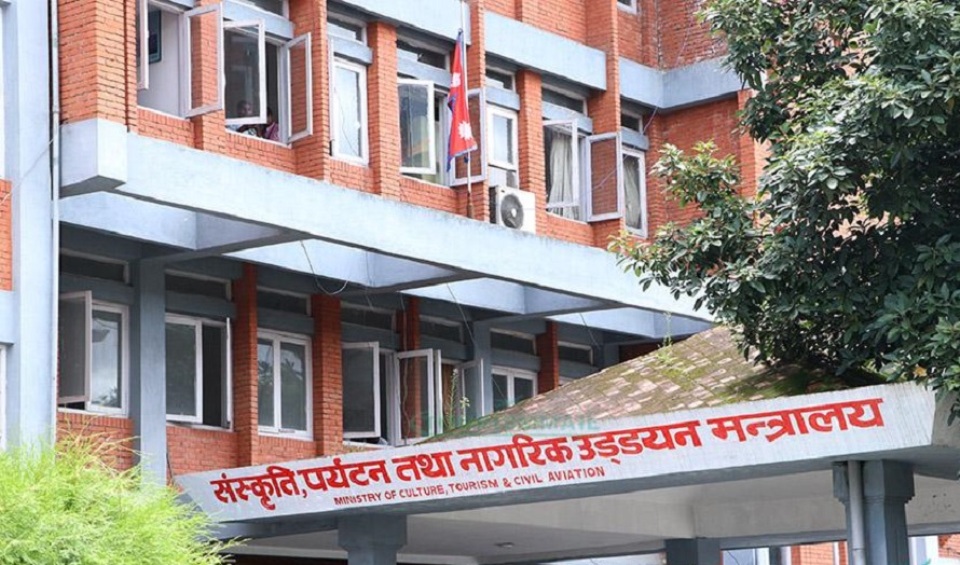
OR
Temporary province capitals turning permanent to avert risks
Published On: January 8, 2020 08:09 AM NPT By: Republica | @RepublicaNepal
KATHMANDU, Jan 8: Faced with multiple complications including potential backlash from local people, most of the federal provinces are turning their temporary capitals into permanent ones, and the rest are also likely to follow suit.
Gandaki, Karnali and Province 1 have so far decided to transform their temporary capitals, which were decided by the erstwhile Deuba government in 2017, into permanent ones. While Gandaki has endorsed Pokhara, Karnali and Province 1 have settled for Surkhet and Biratnagar respectively as their permanent provincial capitals.
Sudur Paschim Province decided to change the provincial capital to Godawari from Dhangadhi in the same district of Kailali. But the decision has courted controversy and has been challenged in court. Ruling party leaders have now found it increasingly difficult to relocate the capital city due to potential backlash from locals.
Of the seven provinces, three are yet to fix their permanent provincial capitals, mainly due to infighting within the ruling party and pressure from residents of the temporary capitals. Differences among key leaders of the ruling party and diminishing prospects in the upcoming elections are also factors weighing in for maintaining the status quo.
As a result, officials in Provinces 3 and 5 have not been able to finalize their provincial capitals even as two years out of their five-year tenures have already elapsed. In Province 2, a majority of the provincial assembly members are for fixing Janakpur as the permanent provincial capital, given the historical importance of the city and the potential for backlash if the capital is shifted.
Ruling Nepal Communist Party (NCP) has asked its members in the Province 3 assembly to vote for Hetauda as permanent capital. Hetauda is the temporary capital fixed just before the 2017 Provincial Assembly election.
Given a two-third majority of the NCP in the provincial assembly, Hetauda is most likely to be endorsed as permanent capital by the ongoing session of the assembly.
However, Province 3 cancelled a previous plan to put the matter to a vote in the assembly after some senior party leaders challenged the NCP decision in favor of Hetauda. Some influential NCP provincial assembly members threatened to vote against the party decision.
But the decision of the NCP is likely to get the support of a majority of members from the opposition Nepali Congress (NC) as well, said leaders of that party.
Fixing a permanent provincial capital has become a herculean task for Province 5 as well, as influential leaders of the NCP stand divided between Dang and Butwal. Experts, however, say moving the capital from Butwal may not be able to garner the required two-third majority vote in the provincial assembly.
Provincial assemblies need a two-third majority for finalizing or changing the provincial capitals and province names. Chief Minister of the province Shankar Pokharel suggested at a party meeting last month in Kathmandu that the NCP leadership finalize the names and capitals of provinces.
Provinces 1, 3 and 5 have two-third majorities for the NCP and Province 2 has a coalition government between RJPN and Samajbadi Party. But, unable to forge consensus within the party, the chief ministers have sought decisions from the ruling party central leadership.
Indecision over provincial capitals has delayed setting up the necessary permanent infrastructure. Provincial governments have been operating from temporary offices in temporary capitals.
Apart from the capital cities, naming the provinces has also become a bone of contention in Province 1, Province 2, Province 3 and Province 5. Although they have done some homework in this connection, this has not yielded any results yet.
You May Like This

Name provinces, fix capitals
Nearly two years after the country started exercising federal system with three tiers of government, more than half of total... Read More...

Govt to fix temporary capitals of provinces
KATHMANDU, Jan 9: The government has said that it is working to announce the temporary capitals of the provinces. ... Read More...

Places proposed for temporary capitals of all seven provinces
KATHMANDU, Jan 2: The government has prepared the outline of the temporary capitals of all the seven provinces in the country. Read More...







Just In
- Public transport to operate during Qatari king’s arrival, TIA to be closed for about half an hour
- One arrested from Jhapa in possession of 43.15 grams of brown sugar
- EC to tighten security arrangements for by-elections
- Gold price drops by Rs 2,700 per tola
- Seven houses destroyed in fire, property worth Rs 5.4 million gutted
- Police pistol missing after drug operation in Bara, investigation underway
- Truck carrying chemical used in drugs catches fire
- Nepali journalists Sedhai and Kharel awarded second prize at Fetisov Journalism Awards for their exposé on worker exploitation in Qatar World Cup











Leave A Comment